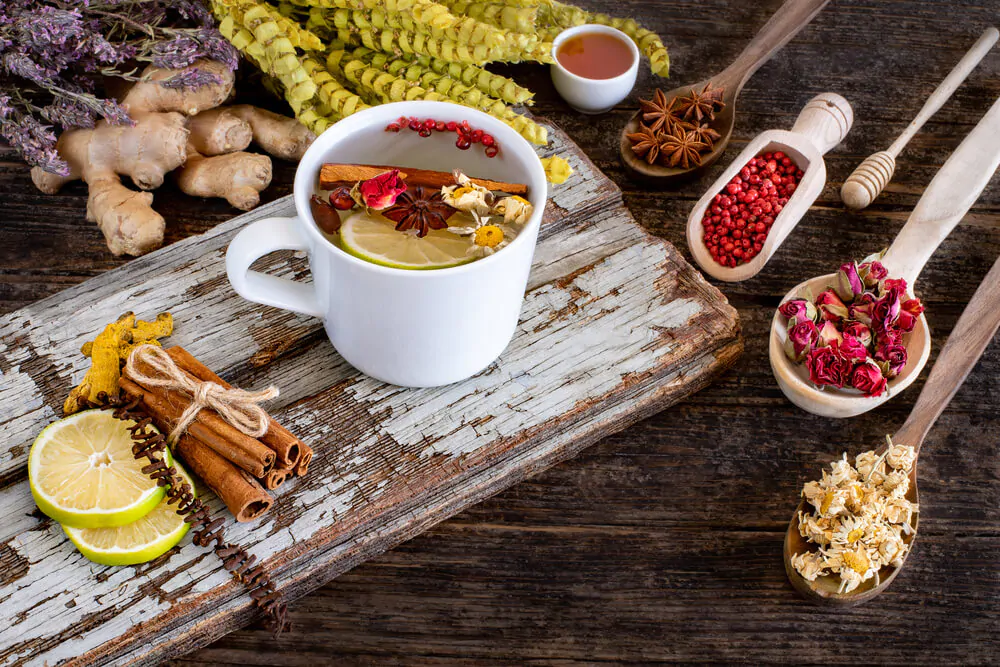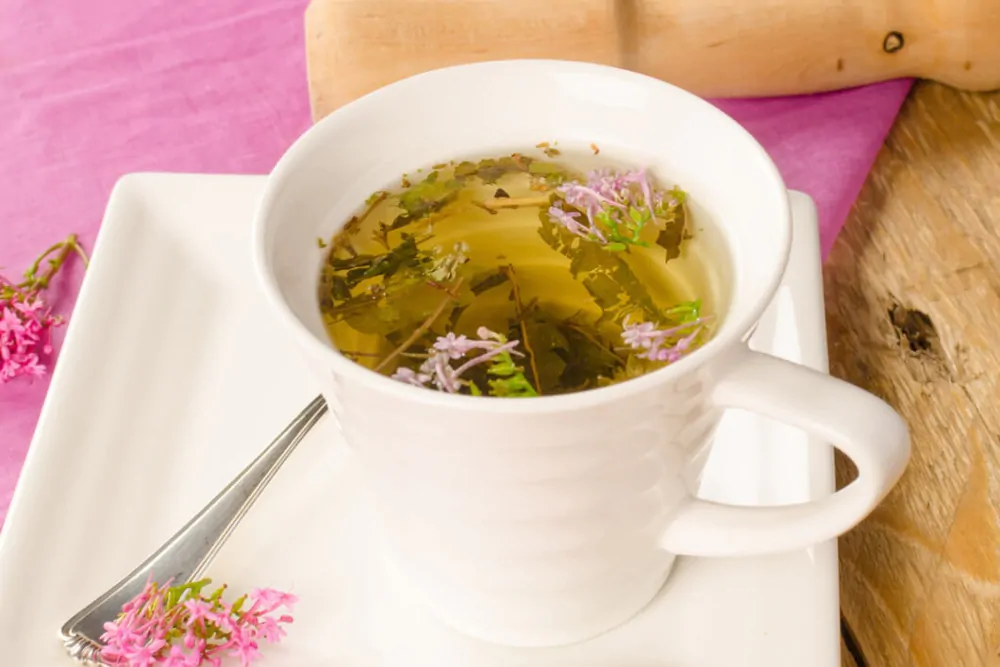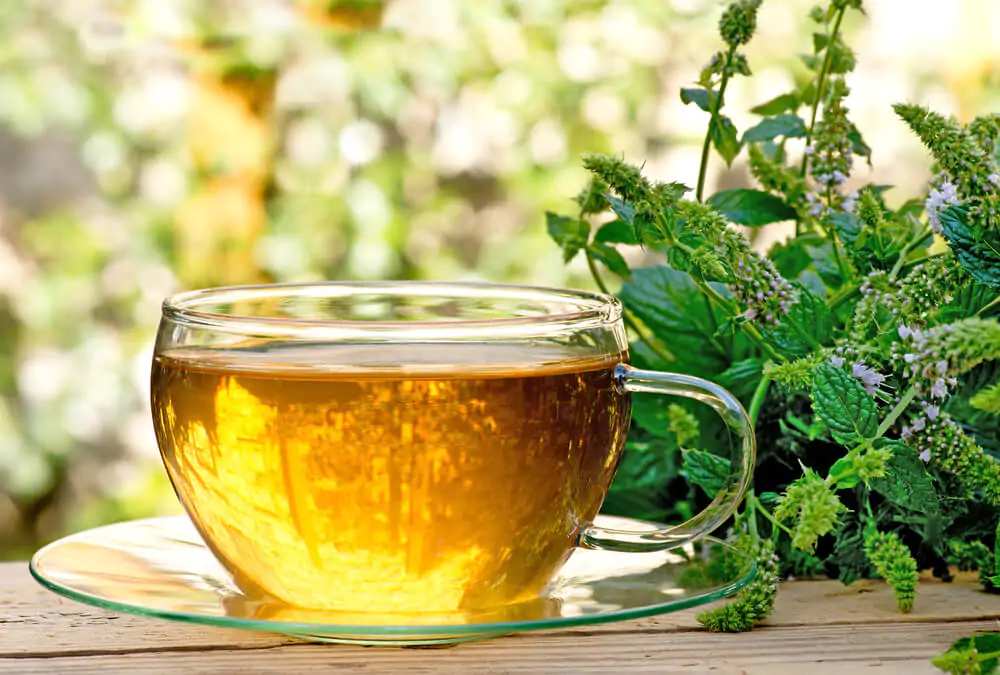Do you want to find out what tea helps you sleep? Our listicle outlines a selection of bedtime teas that may help you sleep.

Around 30% of American adults suffer from symptoms of insomnia. A chronic inability to fall asleep, stay asleep, or achieve restorative sleep impacts health and mood.
If you have trouble falling asleep, there are bedtime teas that may assist. These teas have been medically reviewed by health and wellness professionals, with a range of results. We’ve put together a listicle of bedtime teas to help you sleep.
What Types of Tea Helps You Sleep?
Lack of sleep can make you feel grumpy. But sleep deprivation can also have more profound consequences, putting you at risk of obesity, heart disease, and diabetes. Regular poor sleep may also shorten your life expectancy.
If you have trouble sleeping or you have a sleep disorder, a bedtime tea may help you sleep better.
Using tea as a sleep aid is a centuries-old natural remedy. In particular, herbal teas are popular. Some contain one main herb, others a combination. You might also be wondering what tea is calming.
1. Chamomile Tea
As well as reducing inflammation and treating anxiety, chamomile extract is used as a home remedy for insomnia. Tea bags of chamomile are readily available, either pure or blended with other medicinal herbs.
Chamomile tea is a mild tranquilizer or sleep inducer. Containing an antioxidant called apigenin, chamomile tea has a calming effect.
According to PubMed Central: “Chamomile in the form of an aqueous extract has been frequently used as a mild sedative to calm nerves and reduce anxiety, to treat hysteria, nightmares, insomnia and other sleep problems”.
A National Institutes of Health clinical trial further highlights the positive effect of chamomile tea on sleep quality. Admittedly, research results are mixed, but some studies have encouraging statistics.
2. Lemon Balm Tea
What is lemon balm? It belongs to the mint family, and while lemon balm extract is used for aromatherapy, dried lemon balm leaves are a component of herbal tea. Citrus-scented lemon balm may reduce stress and improve sleep.
There’s evidence to suggest lemon blam increases GABA levels in mice, indicating sedative properties.
As well as helping you fall asleep, lemon balm is said to have a range of other benefits. These range from boosting cognitive function to treating cold sores.
3. Valerian Root Tea
Valerian is a herb that’s popular for treating nervousness and headaches. Valerian tea has also been shown to promote high-quality sleep. Native to Europe and parts of Asia, it also grows in North America.
Medicine is made from the root; drunk as a herbal tea, it seems to act as a sedative on the nervous system and brain. Moreover, no side effects were observed during studies. One theory is that valerian root increases gamma-aminobutyric acid (GABA) levels – a neurotransmitter.

Other studies have shown valerian root decreases the time it takes people to fall asleep. But, while there have been positive results, many health and wellness professionals consider the evidence inconclusive.
4. Passionflower Tea
An eye-catching and beautiful flower, it’s possible to make tea from dried leaves, flowers, and stems. Used to help with anxiety, more recent studies have looked into the ability of passionflower tea to assist with insomnia.
Some results have shown that passionflower and valerian root tea combined can be as effective as Ambien at helping you fall asleep.
5. Lavender Tea
With an aromatic and soothing smell, lavender is a herb that’s been around since ancient times. The small purple buds are said to settle nerves and help people relax. Lavender tea is also said to be a sleep aid.
Although there’s limited scientific evidence to support lavender tea improving sleep quality, its relaxing aroma is thought to help you fall asleep.
6. Magnolia Bark Tea
A flowering plant, magnolia tea is mostly made from bark. It also contains some dried buds and stems. Historically, magnolia was used to help with abdominal discomfort, stress and anxiety, and nasal congestion.
Nowadays, it’s also said to have sedative effects, helping you fall asleep. Magnolia bark tea is thought to work by changing GABA receptors in the brain, increasing sleepiness.
Note: Further research is required on humans to confirm the impact on sleep and whether magnolia tea helps improve sleep.
7. Peppermint Tea
From relieving stress and anxiety to boosting the immune system, peppermint tea has many benefits. It’s also thought of as a sleepytime tea and has been used for centuries as a natural sleep aid.

With its refreshing aroma and taste, peppermint tea may help you achieve restful sleep. How? Peppermint is a muscle relaxant that may reduce stress and anxiety and promote better sleep.
8. Green Tea
Aside from herbal teas, green tea may also help you fall asleep and impact sleep quality. Green tea is a health booster with many benefits. A major major active component is Epigallocatechin Gallate (EGCG), known for its anti-inflammatory and antioxidant properties.
What’s more, green tea may be a sleep inducer. Why?
Green tea contains the amino acid theanine, said to decrease neuron excitement in the brain. Drinking low-caffeinated green tea may reduce fatigue and enhance sleep quality.
But remember, even decaf green tea contains some caffeine, so think before drinking green tea as a bedtime tea. You might be interested in our guide on how much caffeine is in oolong tea.
Should I Drink Tea Before Bed?
Green tea is made from the tea plant Camellia sinensis and is best bought loose as whole leaves. Herbal tea is made by combining dried herbs. If you fancy trying out herbal tea before bed, buy tea bags, or try making your own tea blends at home, using dried herbs.
For example, for valerian tea, measure out the desired portion, pour hot water over, then steep for 10 to 15 minutes.
The Final Word: What Tea Helps You Sleep?
Insomnia and related sleep issues impact productivity, costing the US economy around $63 billion a year. There are many treatments for insomnia; a natural remedy is sleepytime teas.
There’s still much debate about the impact of bedtime tea and whether it promotes better sleep. Many herbal teas as marketed as sleep aids and have been medically reviewed, but can tea really help you sleep?
There’s some evidence to suggest bedtime teas help you achieve restful sleep. For example, clinical trials of 550 global participants found herbal teas helped improve sleep quality. To build a more solid picture, there needs to be additional research.
Be it lemon balm tea, passionflower tea, lavender tea, or chamomile extract, there are many options to consider. Buy in tea bags or blend at home, and discover for yourself whether bedtime tea helps you sleep better.
Want to learn more?
How Does a Cordless Electric Kettle Work?
FAQs About What Tea Helps You Sleep
What is the best tea for sleep?
A range of teas may help you sleep. These include chamomile, passionflower, magnolia bark, lavender, and decaffeinated green tea. If in doubt avoid tea or drinks with caffeine.
What Drink Helps You Sleep?
Drinks that may help you sleep include valerian tea, peppermint tea, lemon balm tea, chamomile tea, and warm milk.
What is the best thing to drink before bed?
The best bedtime or sleepytime drinks include chamomile tea, valerian tea, peppermint tea, cherry juice, and almond milk.
